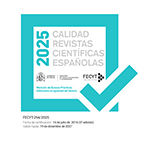La literatura como medio de la memoria: el nacionalsocialismo y el Holocausto en la literatura alemana contemporánea
Resumen
Dentro de la literatura europea la controversia sobre el Holocausto llegó a su punto culminante ven la década de los 90 del siglo XX. Este retraso también es sintomático para la literatura alemana: en los años noventa aparecen numerosas novelas y autobiografías que inscriben, cada una de forma específica, el Holocausto en la memoria cultural de los alemanes. El artículo presenta diferentes formas de memoria literaria del Holocausto a través de los ejemplo de Martin Walser (Ein springender Brunnen), Uwe Timm (Am Beispiel meines Bruders), W.G. Sebald (Austerlitz) y Bernhard Schlink (Der Vorleser). Estas obras oscilan entre los géneros de la autobiografía y la novela y tienen en común el intento de abordar el Holocausto sin olvidar el horror que está relacionado con él. La literatura demuestra ser un medio de la memoria que a la vez refleja de manera crítica el proceso de la memoria
Descargas
Descarga artículo
Licencia
La Revista de Filología Alemana, para fomentar el intercambio global del conocimiento, facilita el acceso sin restricciones a sus contenidos desde el momento de su publicación en la presente edición electrónica, y por eso es una revista de acceso abierto. Los originales publicados en esta revista son propiedad de la Universidad Complutense de Madrid y es obligatorio citar su procedencia en cualquier reproducción total o parcial. Todos los contenidos se distribuyen bajo una licencia de uso y distribución Creative Commons Reconocimiento 4.0 (CC BY 4.0). Esta circunstancia ha de hacerse constar expresamente de esta forma cuando sea necesario. Puede consultar la versión informativa y el texto legal de la licencia.










